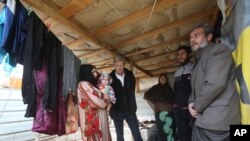The United Nations is appealing to the Syrian government to provide the permits needed to send humanitarian aid convoys into besieged and hard-to-reach areas and to allow a life-saving vaccination campaign for children to go ahead.
United Nations convoys have delivered desperately needed humanitarian assistance to nearly 260,000 people living in those areas of Syria since the beginning of the year. Aid agencies aim to reach more than 1 million people before the end of April.
The U.N., however, says it has not received permission to enter six areas - most government-controlled - where hundreds of thousands of people have received no relief supplies for more than one year. It is calling for the blockade of these places to be lifted.
Jan Egeland is the special adviser to the U.N. special envoy for Syria. Egeland says he is particularly concerned by the government’s refusal to allow medical relief supplies, including surgical and trauma care equipment, to be delivered.
“We are not able to get through medical personnel. We are not able to get medical assessment personnel. We are not able to do medical evacuations from besieged areas and even some hard-to-reach areas. So people are dying," said Egeland.
Egeland says the inability to get medical supplies and personnel into these areas could jeopardize an important national vaccination campaign planned for between April 18 and 24. He says the campaign aims to inoculate the millions of children who are not vaccinated against killer diseases in Syria.
“That would be part of a three-phase vaccination campaign …against a number of diseases that are now threatening to spread in Syria because the vaccination rate is now in many areas down to 50 or 60 percent, which is a prescription for epidemic disease," he said.
Egeland says children will be vaccinated against polio, measles and other communicable diseases. A cluster of 22 cases of polio was detected in Syria in October 2013. The country had been free of the crippling disease since 1999.
Egeland says the disease was eventually brought under control, but he warns polio could spread again in the country and across borders if the planned vaccination campaign does not go ahead.











